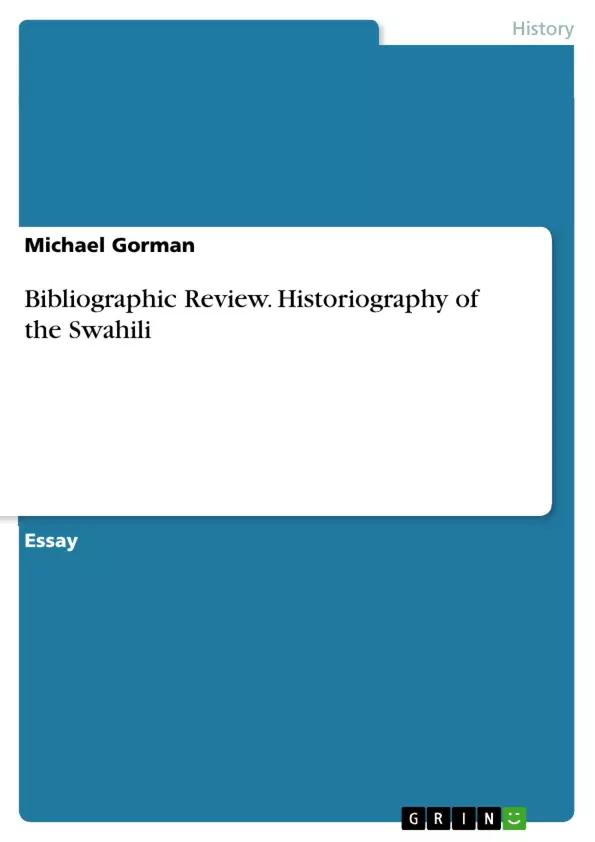The development of Swahili maritime trade culture and their place in the old world web has been the topic of debate and discussion for centuries. In the most recent decades of the study of their history, emphasis has been placed on the Swahili's African origins over their Islamic origins, and how this position is more fundamental in understanding their culture and individual societies. The composition of the Swahili’s African origins with their Islamic, Arab, Indian, and Austronesian roots and influences, as well as their impact on community building and economic development have been the subject of monographs by Derek Nurse and Thomas Spear, Michael Pearson, and Mark Horton and John Middleton.
Inhaltsverzeichnis (Table of Contents)
- The Development of Swahili Maritime Trade Culture
- The African Origins of the Swahili
- The Swahili: Reconstructing the History and Language of an African Society, 800–1500 by Derek Nurse and Thomas Spear
- The Tangled Web of Swahili History
- The Africanization of Swahili History and Culture
- The Synthesis of African and Arab Ideas
- The Swahili's Bantu Origins
- The Gradual Conversion to Islam
- The Tana River Origins of the Swahili
- The Swahili's Indigenous Culture
- Maritime Trading Diaspora
- Port Cities and Intruders: The Swahili Coast, India, and Portugal in the Early Modern Era by Michael Pearson
- African Historiography in Flux
- The Swahili's Perceived Foreign Origins
- The Roots of European Racism in Swahili Origins
- The Swahili as a Coastal People
- Pre-Islamic Contact with India
- The Swahili's Willing Conversion to Islam
- Linguistic Evidence of Swahili Origins
Zielsetzung und Themenschwerpunkte (Objectives and Key Themes)
This bibliographic review examines the historiography of the Swahili, focusing on the debate surrounding their origins and the evolution of scholarly understanding regarding their cultural development. The review explores the key works of Derek Nurse and Thomas Spear, as well as Michael Pearson, in tracing the shift in historical perspective from a predominantly Arab-centric view to a more nuanced understanding of the Swahili's African roots.
- The Africanization of Swahili History
- The Interplay of African and Islamic Influences
- The Role of Oral Traditions and Linguistic Evidence
- The Impact of Maritime Trade on Swahili Society
- The Influence of European Colonialism on Swahili Historiography
Zusammenfassung der Kapitel (Chapter Summaries)
The review begins by discussing the long-held belief that the Swahili originated from the Shiraz people of Persia, a notion perpetuated by Europeans during colonization. However, more recent archaeological discoveries and linguistic studies have revealed a stronger indigenous African lineage within Swahili communities, predating the arrival of Arab and Islamic influence. This shift in understanding is highlighted through the work of Derek Nurse and Thomas Spear, who argue that the Swahili are an African people with a complex cultural synthesis of African and Arab influences. Their research emphasizes the Bantu origins of the Swahili language and the role of trade in shaping their society.
Michael Pearson continues the exploration of Swahili origins by examining the impact of European colonialism on the perception of Swahili history. He challenges the notion that Swahili identity is solely derived from Arab influences, emphasizing their connections to India and their willingness to adopt Islam for economic and political gain. Pearson's work also reveals the evolution of African historiography as scholars move away from Eurocentric perspectives and embrace a more contextualized understanding of African societies.
Schlüsselwörter (Keywords)
The key terms and concepts explored in this review include Swahili history, African origins, Islamic influence, maritime trade, oral tradition, linguistic evidence, European colonialism, and the Africanization of Swahili history. The review focuses on the ongoing debate regarding the origins of the Swahili, highlighting the interplay of African and Arab influences in shaping their culture and society.
Frequently Asked Questions
What is the main debate in Swahili historiography?
The debate centers on whether the Swahili culture has primarily Arab/Islamic origins or indigenous African/Bantu origins.
How has the perspective on Swahili origins changed recently?
Scholars have moved away from a Eurocentric, Arab-focused view toward an "Africanization" of Swahili history, emphasizing their Bantu roots and local cultural development.
What did Derek Nurse and Thomas Spear contribute to this field?
They used linguistic and archaeological evidence to prove that the Swahili are an African people whose culture synthesized local traditions with foreign influences through trade.
Is the Swahili language of African origin?
Yes, linguistic evidence analyzed in the review emphasizes the Bantu origins of the Swahili language, predating significant Arab influence.
How did European colonialism influence Swahili history?
Colonial historians often attributed Swahili achievements to foreign "intruders" (Persians or Arabs) due to racist biases that downplayed indigenous African capabilities.
Why did the Swahili convert to Islam according to Michael Pearson?
Pearson suggests that conversion was often a willing choice made for economic and political advantages within the Indian Ocean trade network.
- Quote paper
- M.A. Michael Gorman (Author), 2022, Bibliographic Review. Historiography of the Swahili, Munich, GRIN Verlag, https://www.grin.com/document/1246981



